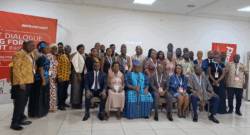… a step forward in anti-corruption efforts
By Ken G. ASANTE
The recent publication of the report by Ghana’s Office of the Special Prosecutor (OSP) concerning the Airbus SE scandal represents a crucial development in the nation’s ongoing fight against corruption.
This investigative report, which investigates allegations of bribery involving Ghanaian public officials and the European aerospace firm Airbus, is a significant move towards fostering transparency, accountability, and the rule of law in Ghana.
The Airbus SE scandal has attracted international attention, implicating multiple countries in a vast corruption network. The allegations of bribes paid to high-ranking officials between 2009 and 2015 raised serious concerns regarding the integrity of Ghana’s political and procurement processes. The OSP’s report establishes a clear precedent that allegations involving a former president, and his associates will not be ignored but addressed rigorously through the full extent of the law.
Rigorous and transparent investigation
A standout feature of the OSP’s report is the thoroughness of the investigation. Led by Mr. Kissi Agyebeng, the office has shown a steadfast commitment to uncovering the truth, despite the complexities associated with such a high-profile case. The report meticulously outlines the investigative steps taken, from evidence collection to the questioning of key individuals. This level of transparency is essential in maintaining public trust in both the process and the OSP as an institution.
The investigation examined various aspects of the scandal, including the roles of local and international actors. The OSP’s capacity to navigate international legal frameworks for evidence gathering and collaboration with other jurisdictions is particularly commendable, showcasing its ability to manage complex transnational cases and setting a precedent for future inquiries of this nature.
Holding the powerful accountable
One of the report’s most significant outcomes is its assertion that the investigation was comprehensive, even though no individuals were ultimately found guilty of the allegations. The report issues a cautionary note regarding potential conflicts of interest for former presidents and future leaders, urging them to avoid actions that could bring the high office into disrepute.
The report’s candidness in discussing its findings—acknowledging the challenges of proving guilt in such prominent cases—demonstrates the OSP’s commitment to impartial and thorough inquiry. By rigorously investigating and publicly disclosing the outcomes, the OSP reinforces the principle that all allegations, particularly those involving high-ranking officials, will be scrutinised. This approach is vital for dismantling the culture of impunity that has long affected Ghana’s political landscape, even if it does not always lead to prosecution.
Strengthening Ghana’s anti-corruption credentials
On a broader scale, the release of this report significantly enhances Ghana’s anti-corruption credentials internationally. In recent years, Ghana has faced criticism for perceived shortcomings in its anti-corruption measures, with claims that the government has been slow to respond to major scandals.
The OSP’s decisive action in the Airbus SE case counters this narrative, positioning Ghana as a nation serious about combating corruption, no matter how deeply entrenched.
The report’s international implications are considerable. Ghana’s proactive investigation of corruption involving a global corporation like Airbus sends a robust message to the global community, affirming the country’s commitment to maintaining international standards of integrity and transparency. This can only enhance its reputation as a stable and reliable partner in international relations.
Learning lessons and moving forward
While the report marks a significant achievement, it also underscores the need for ongoing vigilance in the battle against corruption. The Airbus SE scandal serves as a stark reminder of the systemic vulnerabilities within Ghana’s procurement processes. Moving forward, the government and relevant institutions must implement the report’s recommendations to avert similar incidents in the future.
Enhancing institutional frameworks, improving oversight mechanisms, and fostering a culture of integrity within the public service are essential steps to take. The OSP’s report should act as a catalyst for broader reforms aimed at closing the loopholes that allow corruption to flourish.
A call for public support
Finally, the release of the report is a rallying cry for the Ghanaian public. The fight against corruption cannot be the sole responsibility of the OSP; it demands the active engagement and support of all citizens. Public awareness and involvement are crucial to ensuring that the findings and recommendations of the report are not only implemented but sustained over the long term.
Ghanaians must hold their leaders and institutions accountable and support the OSP in its efforts to eradicate corruption. This report represents a positive step forward, but it is merely one part of a larger journey toward a more transparent and accountable society.
The OSP’s report on the Airbus SE scandal is a landmark achievement in Ghana’s anti-corruption efforts. It reflects a rigorous, transparent, and objective investigation that holds the powerful accountable and reinforces Ghana’s commitment to international standards of integrity.
As the nation progresses, the lessons gleaned from this scandal must be transformed into tangible actions that bolster Ghana’s institutional frameworks and promote a culture of integrity. The OSP has set a bold precedent, and it is now incumbent upon all stakeholders to build on this momentum and continue the fight against corruption in Ghana.










